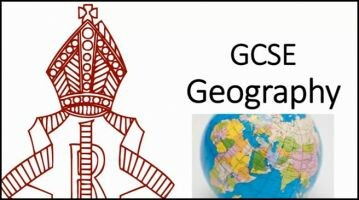Geography
Subject: Geography
Syllabus Number: AQA 9030
Teacher who leads the subject: Mrs M Wilburn
Click on the image below to find out more:
Why study Geography?
Geography helps you to make sense of the world around you. It is hands on, it is relevant and it is fun. The course will give you the chance to get to grips with some of the big questions which affect our world and understand the social, economic, physical forces and processes which shape and change our world.
You will have the opportunity to learn a wide range of skills such as modern computer based mapping (called GIS), map skills, interpreting photographs, fieldwork skills, presenting, decision making, problem solving, role play and debating techniques. You will also improve your literacy skills through your report writing and written work and make practical use of your numeracy skills through interpreting data and constructing graphs. You will take part in two fieldwork activities which enable you to gain first-hand experience of some of the things you’ve learnt about in class.
The range of skills that you develop in Geography is highly valued by a wide range of different employers. It opens up a wide range of career opportunities such as sustainability and green issues, hazard management, urban regeneration, law and human rights, global business or medicine.
Outline of syllabus content
Three themes that cover physical, human and environmental geography:
Unit 1:Living with the physical environment
-
The Challenge of Natural Hazards (Tectonic Hazards, Tropical Storms, Extreme Weather & Climate Change – what causes them to happen, what impacts do they bring and how we can manage them now and in the future)
-
Physical landscapes in the UK (2 of: Coastal Landscapes, River Landscapes and Glacial Landscapes)
-
Living World (2 of: Tropical Rainforests, Hot Deserts, Cold Environments)
Unit 2: Challenges in the Human Environment
-
Urban issues and challenges (How and why do cities grow? What problems and opportunities do they bring? How can they become more sustainable?)
-
Changing economic world (How does the wealth of countries vary? How can we reduce the gap between the rich and poor?)
-
Challenge of resource management (What challenges do we have over resources (food, water and energy? How can we increase the supply of these resources?)
Unit 3: Geographical Applications
-
Issues Evaluation (problem solving paper on a contemporary geographical issue)
-
Fieldwork (carry out two pieces of fieldwork – one human and one physical)
-
Geographical Skills
Assessment
There are three written exams taken in the summer term of Year 11:
Unit 1: Written exam is 1hr 30mins in length. Question types (for all units): multiple-choice, short answer, levels of response, extended prose (35% of GCSE)
Unit 2: Written exam is 1hr 30mins in length. Question types (for all units): multiple-choice, short answer, levels of response, extended prose (35% of GCSE)
Unit 3: Written exam is 1hr in length. It includes a problem solving exercise based on pre-released material and questions on fieldwork and geographical skills (30% of GCSE)
Additional information is available on the Curriculum Overview section of the website - click here

